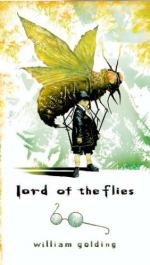|
This section contains 1,436 words (approx. 5 pages at 300 words per page) |

|
Lord of the Flies, a Critical Review
Summary: Discusses the novel Lord of the Flies, by William Golding. Compares it to the Thomas Hobbes' book, Leviathan. Considers how Hobbes' theory for the "natural state" of man is presented in the novel.
In Thomas Hobbes's book, Leviathan, a theory for the "natural state" of man is presented. This theory explains that man was purely selfish by nature, and the only reason any sort of societal structure exists is because it is in man's individual best-interest to have one. Golding deals with the issue of man's selfishness and societal structure by using his characters to show selfishness and leadership. Golding's novel, Lord of the Flies, addresses this issue of man's selfishness and why societal structure exists. Lord of the Flies supports the idea that man is basically selfish at heart, just as Hobbes suggested, and confirms the belief that societal structure exists only because it is in man's individual best-interest.
The first sign of leadership in the book is Ralph. Ralph is the democratically elected leader of the group of boys. This shows that the boys recognized that nothing would get...
|
This section contains 1,436 words (approx. 5 pages at 300 words per page) |

|


